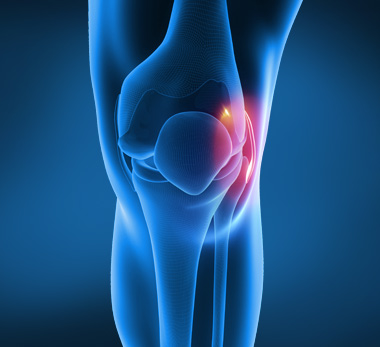
Your MCL is a ligament that supports the inside aspect of your knee. The ligament connects from the lower femur (thigh bone), runs down across the inside of the knee joint and then attaches to your tibia (shin bone). An MCL sprain is when this ligament is overstretched or torn and sustains damage to the ligament fibres. Injuries to the MCL are very painful
An MCL sprain usually occurs during sporting activity when a blow is sustained to the outside of your knee, or when your knee flexes inwards over a fixed foot. In these positions, the MCL is placed under strain and damage can occur to the ligament fibres.
It is common in sports and is also referred to as a ‘bumper bar’ injury because it can be injured when a car hits a pedestrian. At the time of injury, pain is usually felt on the inside of the knee and mild swelling may occur in the days following the injury. In a severe MCL injury, the knee may feel unstable.
Your physiotherapist will first undertake a thorough assessment including specific clinical tests to determine the extent of your MCL sprain. If a high-grade sprain occurs the physiotherapist will assess other structures of the knee that may also be damaged. The physiotherapist will also be able to inform you as to whether further imaging is required.
Advice and education regarding swelling management will be given including rest, ice, compression and elevation. Your physiotherapist may employ treatments such as electrotherapy modalities, soft tissue massage, dry needling, taping the knee, stretching, range of motion and strengthening exercises. They may also suggest the short term use of a Zimmer splint or hinge brace in more severe MCL sprains.
High-level sports specific and functional exercises such as jumping, hopping and twisting should be completed at the later stages of rehabilitation.
Return to sport depends on the extent of your MCL sprain. Approximate return to sport times are as followed:
Grade 1: 2 – 3 weeks
Grade 2: 4 – 8 weeks
Grade 3: 8 – 12 weeks
MCL complete rupture: 8 – 12 weeks – surgery is only required in rare cases when conservative measures fail.
On return to sport, the physiotherapist may recommend taping your knee or a knee brace for added support.
Nearly all MCL tears heal well with time and adequate rehabilitation. In severe MCL injuries, other knee structures should be properly assessed to rule out damage. MCL injuries are painful and the pain does persist for the length of the recovery process. Surgery is only required in rare cases.
To find out more or to make an appointment, contact us here.
Eramosa Physiotherapy © Website by WebSteps